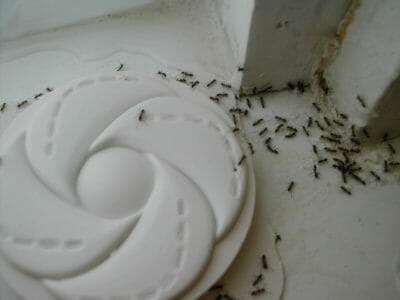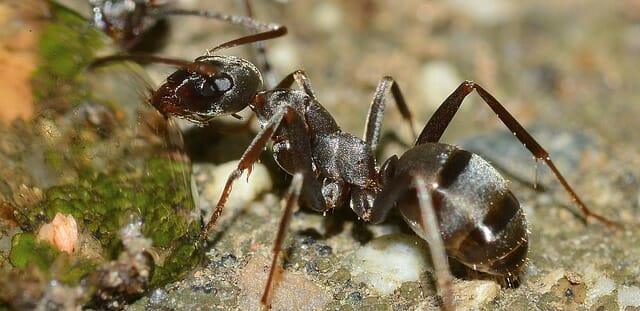Ah, spring! It’s a beautiful season, marked by the arrival of things we greet joyfully: longer days, warmer temperatures, much-loved perennials poking out of the soil, and fully stocked garden centers. But spring also sees the return of some things that we don’t greet with as much joy. Like ants, especially when they make their way inside our homes.
Ants hibernate over the winter. Just like bears, they gorge on food in the fall. Their bodies survive off those stored nutrients over the winter. And then, just like bears, when warmer temperatures arrive, ants emerge from their nests seeking food. In those early spring days, when the nights are still chilly, they also look for a warm place to spend the night.
Discouraging Ant Visitors
Ants communicate with each other by secreting pheromones (natural bodily chemicals created by mammals and insects). When an ant locates food, it will create a pheromone trail for other ants to follow to the food source. Because tiny ants can squeeze through minute crevices, it’s often difficult to figure out where they are entering the house so that the entrance can be sealed. If you don’t know where to block them from entering, ants will continue following the pheromone trail into your house.
Keeping your home free from food debris will deter ants from visiting. They are especially attracted to sweet foods, like fruit, fruit juices, honey and sugar. Keep your counter and table surfaces clean, your floors swept, and your compost and trash bins tightly covered. Ants also need water. If they seem to be coming in for a drink, remove or relocate that water source (e.g., pet bowl).
Check the exterior of your home and caulk up any noticeable crevices. If you don’t have caulk on hand or the hole is very small, you can use petroleum jelly, which will hold its seal for about a year.
Natural Ant Repellents
If you’ve removed their food and water sources, and have sealed any noticeable entrances, but you still have ants indoors, there are a number of cheap natural repellents that you can use.
1. White vinegar or lemon juice
Vinegar and lemon juice both disrupt the pheromone trails, making it difficult for ants to know where to go. Mix one part white vinegar (or one part lemon juice) with one part water. The solution can be sprayed around the area the ants congregate and/or their suspected entrance, or it can be applied to a cloth so that those surfaces can be wiped down.
2. Essential oils
A number of different essential oils may deter ants from coming in, including eucalyptus, cinnamon, clove, tea tree, peppermint, neem and citrus oils. Like vinegar and lemon juice, essential oils disrupt the ants’ pheromone trails. Citrus oils have an added benefit: because they contain d-limonene, they’re toxic to ants.
 Essential oils may be applied by swabbing the area with an oil-soaked cotton ball, or by spraying. Some online sites suggest mixing 10 drops of essential oil to one cup of water; others suggest mixing equal parts essential oil and water. Personally, I would probably start with 10-20 drops of oil to about ½ cup of water, and if that didn’t seem to be working after a few days, I would add more essential oil.
Essential oils may be applied by swabbing the area with an oil-soaked cotton ball, or by spraying. Some online sites suggest mixing 10 drops of essential oil to one cup of water; others suggest mixing equal parts essential oil and water. Personally, I would probably start with 10-20 drops of oil to about ½ cup of water, and if that didn’t seem to be working after a few days, I would add more essential oil.
Heather at mommypotamus.com suggests putting vodka into the spray, too, which will help keep the oil and water from separating. Her “recipe” calls for ¼ cup of water, ¼ cup of vodka, and 30-40 drops of essential oil.
3. Spices
If you don’t have essential oils on hand, you can use similar spices, such as ground cinnamon, ground cloves, dried mint, cayenne pepper, black pepper, salt, bay leaves, or garlic powder. Just sprinkle where needed.
4. Food grade diatomaceous earth
While DE has health benefits for mammals and plants, it is toxic to insects that have exoskeletons, including ants. The sharp edges of DE particles damage the waxy coating on ants, and once that happens, DE dehydrates the insect.
Diatomaceous Earth: The All-Natural Ant Killer!
To use, just sprinkle it where ants travel and/or congregate.
5. Soap and water
Soap creates a coating on insects which makes it impossible for air to reach them, and as a result, they suffocate. Make a spray by combining ¼ cup of dish detergent with 1 cup of water. It’s best to spray ants directly.
In general, ants are beneficial in the garden. They aerate soil, pollinate plants and distribute seeds. Also, ants are not herbivores and usually don’t damage plants, but they do prey on other herbivorous bugs that may be chowing down on your plants. Wherever possible, it’s best to leave outdoor ants alone. However, if they’ve built an anthill very close to your house, and are entering it, it may be best to kill off the entire colony by dousing the hill with a pot full of hot soapy water.
There are many other suggested natural ant repellents. Some, like coffee grounds and cornmeal, are reported by some online sites as being ineffective. Others, like borax, are not recommended to use around small children or pets. If you’ve had success with any natural ant repellents, please let us know in the comments below.
How do you get rid of ants? Share your suggestions in the section below:
 Off The Grid News Better Ideas For Off The Grid Living
Off The Grid News Better Ideas For Off The Grid Living




